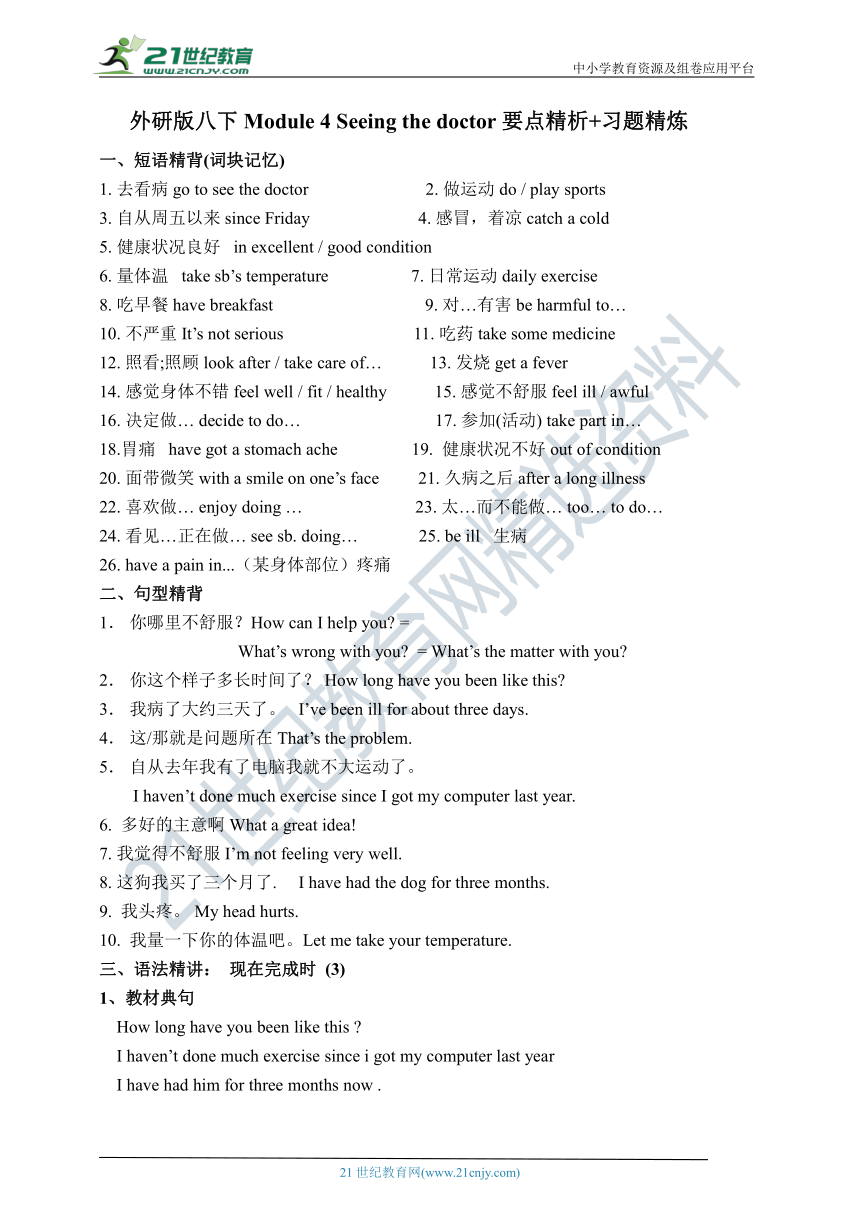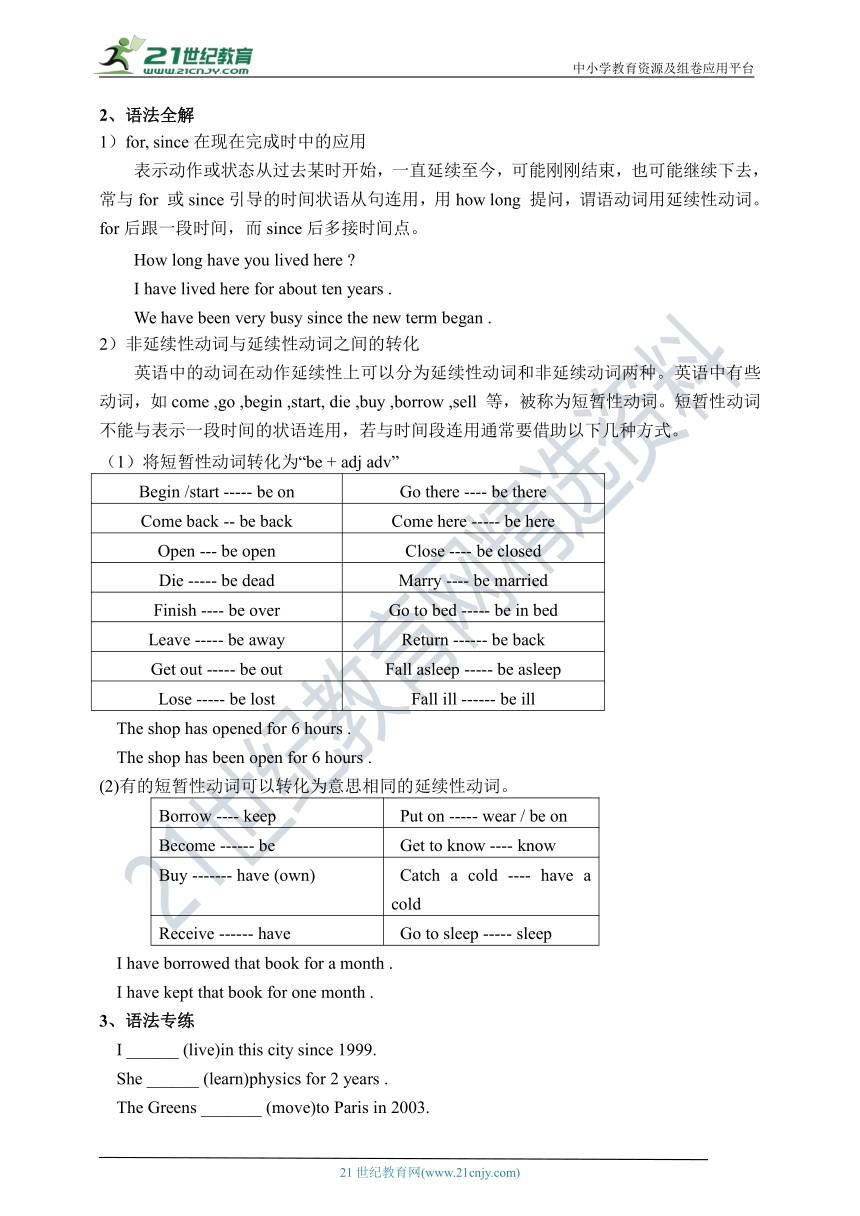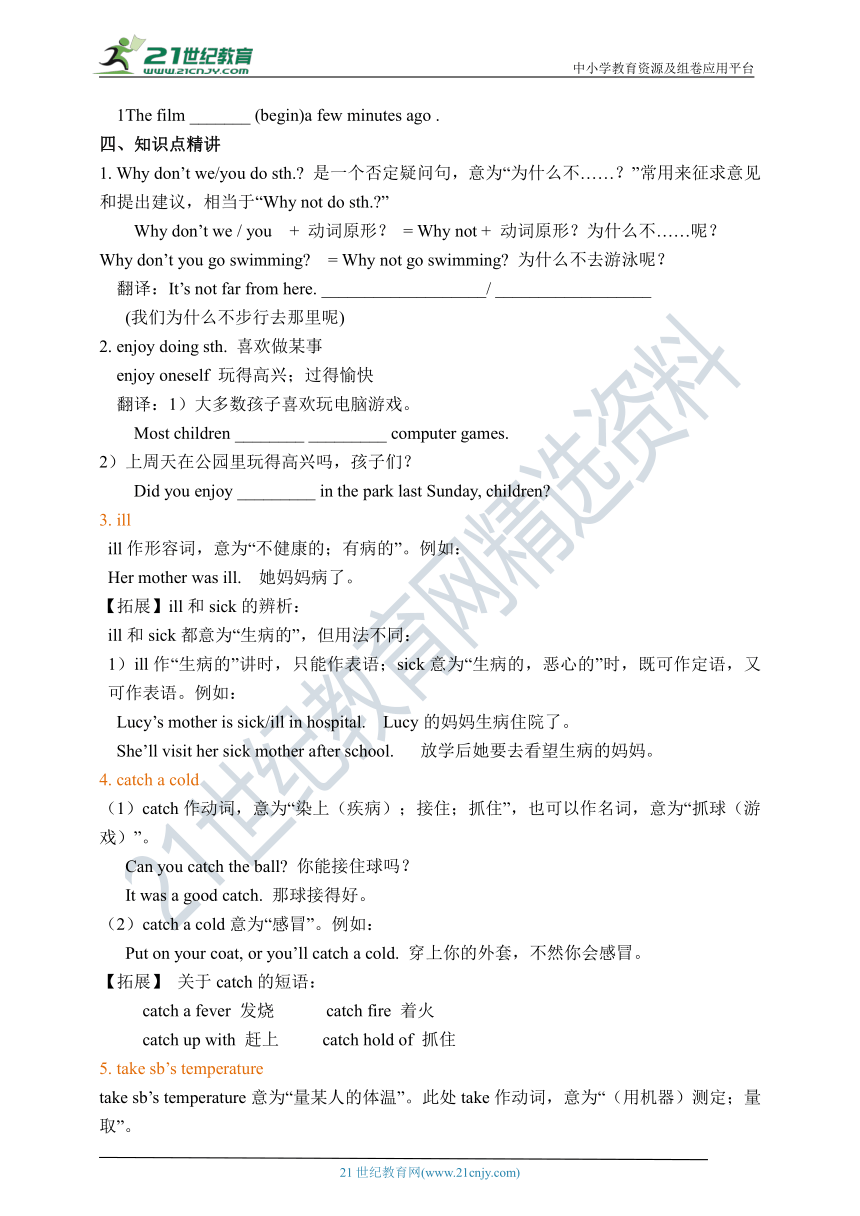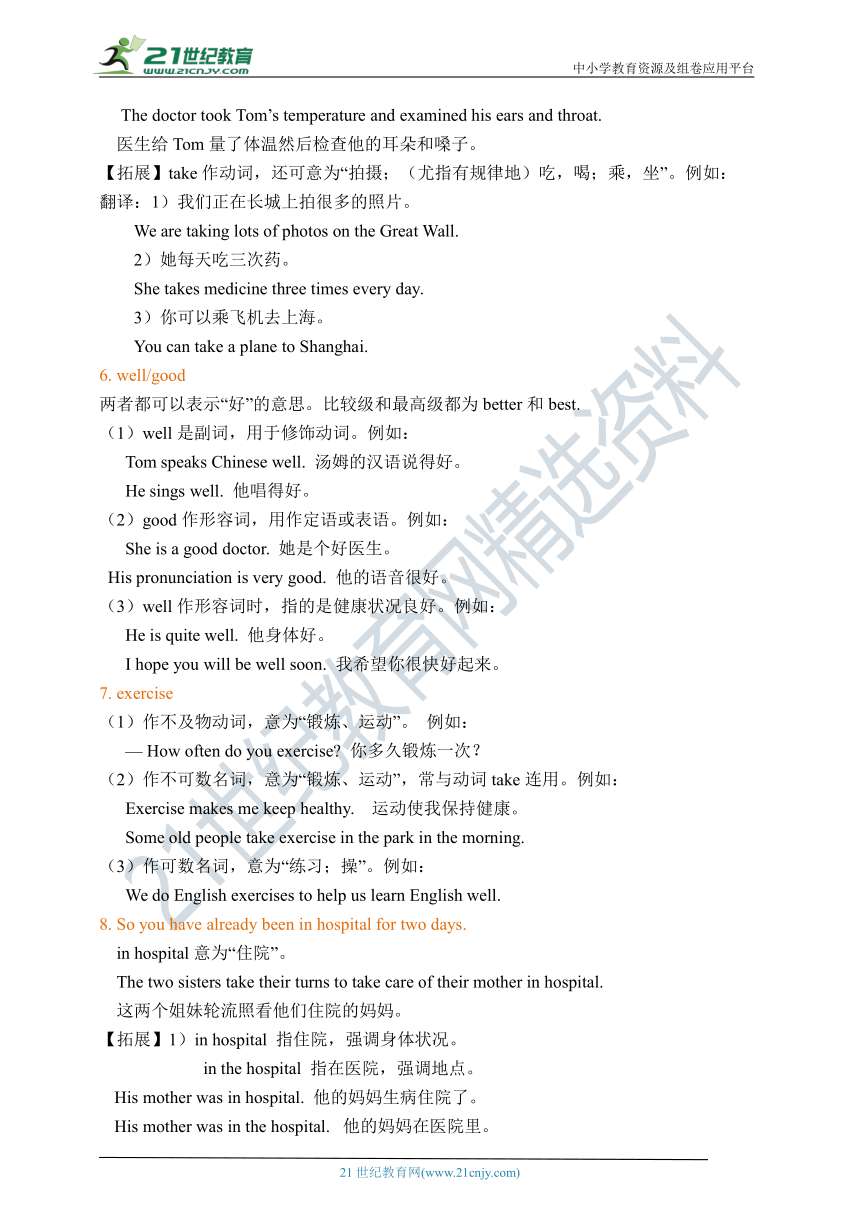Module 4 Seeing the doctor 模块同步学案(要点精析+习题精炼)
文档属性
| 名称 | Module 4 Seeing the doctor 模块同步学案(要点精析+习题精炼) |

|
|
| 格式 | zip | ||
| 文件大小 | 1.2MB | ||
| 资源类型 | 试卷 | ||
| 版本资源 | 外研版 | ||
| 科目 | 英语 | ||
| 更新时间 | 2020-03-29 00:00:00 | ||
图片预览




文档简介
中小学教育资源及组卷应用平台
外研版八下Module 4 Seeing the doctor要点精析+习题精炼
一、短语精背(词块记忆)
1.?去看病go?to?see?the?doctor? 2.?做运动do?/?play?sports?
3.?自从周五以来since?Friday? 4.?感冒,着凉?catch?a?cold?
5.?健康状况良好? in?excellent?/?good?condition
6.?量体温 ?take?sb’s?temperature? 7.?日常运动?daily?exercise?
8.?吃早餐?have?breakfast? 9.?对…有害be?harmful?to…?
10.?不严重?It’s?not?serious? ?11.?吃药?take?some?medicine?
12.?照看;照顾?look?after?/?take?care?of…? 13.?发烧?get?a?fever?
14.?感觉身体不错?feel?well?/?fit?/?healthy? 15.?感觉不舒服feel?ill?/?awful?
16.?决定做…?decide?to?do…? 17.?参加(活动)?take?part?in…?
18.胃痛? have?got?a?stomach?ache? 19. 健康状况不好?out?of?condition?
20.?面带微笑with?a?smile?on?one’s?face? 21.?久病之后?after?a?long?illness?
22.?喜欢做…?enjoy?doing?…?? 23.?太…而不能做…?too…?to?do…?
24.?看见…正在做…?see?sb.?doing… 25. be ill ?生病
26. have a pain in...(某身体部位)疼痛
二、句型精背
1.?你哪里不舒服?How?can?I?help?you??=
What’s?wrong?with?you???= What’s?the?matter?with?you??
2.?你这个样子多长时间了??How?long?have?you?been?like?this??
3.?我病了大约三天了。? I’ve?been?ill?for?about?three?days.?
4.?这/那就是问题所在?That’s?the?problem.?
5.?自从去年我有了电脑我就不大运动了。?
I?haven’t?done?much?exercise?since?I?got?my?computer?last?year.?
6.??多好的主意啊?What?a?great?idea!?
7.?我觉得不舒服I’m?not?feeling?very?well.?
8.?这狗我买了三个月了.??? I?have?had?the?dog?for?three?months.??
9. 我头疼。?My?head?hurts.?
10. 我量一下你的体温吧。Let?me?take?your?temperature.?
三、语法精讲: 现在完成时 (3)
1、教材典句
How long have you been like this ?
I haven’t done much exercise since i got my computer last year
I have had him for three months now .
语法全解
1)for, since在现在完成时中的应用
表示动作或状态从过去某时开始,一直延续至今,可能刚刚结束,也可能继续下去,常与for 或since引导的时间状语从句连用,用how long 提问,谓语动词用延续性动词。for后跟一段时间,而since后多接时间点。
How long have you lived here ?
I have lived here for about ten years .
We have been very busy since the new term began .
2)非延续性动词与延续性动词之间的转化
英语中的动词在动作延续性上可以分为延续性动词和非延续动词两种。英语中有些动词,如come ,go ,begin ,start, die ,buy ,borrow ,sell 等,被称为短暂性动词。短暂性动词不能与表示一段时间的状语连用,若与时间段连用通常要借助以下几种方式。
将短暂性动词转化为“be + adj adv”
Begin /start ----- be on Go there ---- be there
Come back -- be back Come here ----- be here
Open --- be open Close ---- be closed
Die ----- be dead Marry ---- be married
Finish ---- be over Go to bed ----- be in bed
Leave ----- be away Return ------ be back
Get out ----- be out Fall asleep ----- be asleep
Lose ----- be lost Fall ill ------ be ill
The shop has opened for 6 hours .
The shop has been open for 6 hours .
有的短暂性动词可以转化为意思相同的延续性动词。
Borrow ---- keep Put on ----- wear / be on
Become ------ be Get to know ---- know
Buy ------- have (own) Catch a cold ---- have a cold
Receive ------ have Go to sleep ----- sleep
I have borrowed that book for a month .
I have kept that book for one month .
3、语法专练
I ______ (live)in this city since 1999.
She ______ (learn)physics for 2 years .
The Greens _______ (move)to Paris in 2003.
1The film _______ (begin)a few minutes ago .
四、知识点精讲
1. Why don’t we/you do sth.? 是一个否定疑问句,意为“为什么不……?”常用来征求意见和提出建议,相当于“Why not do sth.?”
Why don’t we / you + 动词原形? = Why not + 动词原形?为什么不……呢?
Why don’t you go swimming? = Why not go swimming? 为什么不去游泳呢?
翻译:It’s not far from here. ___________________/ __________________
(我们为什么不步行去那里呢)
2. enjoy doing sth. 喜欢做某事
enjoy oneself 玩得高兴;过得愉快
翻译:1)大多数孩子喜欢玩电脑游戏。
Most children ________ _________ computer games.
2)上周天在公园里玩得高兴吗,孩子们?
Did you enjoy _________ in the park last Sunday, children?
3. ill
ill作形容词,意为“不健康的;有病的”。例如:
Her mother was ill. 她妈妈病了。
【拓展】ill和sick的辨析:
ill和sick都意为“生病的”,但用法不同:
1)ill作“生病的”讲时,只能作表语;sick意为“生病的,恶心的”时,既可作定语,又可作表语。例如:
Lucy’s mother is sick/ill in hospital. Lucy的妈妈生病住院了。
She’ll visit her sick mother after school. 放学后她要去看望生病的妈妈。
4. catch a cold
(1)catch作动词,意为“染上(疾病);接住;抓住”,也可以作名词,意为“抓球(游戏)”。
Can you catch the ball? 你能接住球吗?
It was a good catch. 那球接得好。
(2)catch a cold意为“感冒”。例如:
Put on your coat, or you’ll catch a cold. 穿上你的外套,不然你会感冒。
【拓展】 关于catch的短语:
catch a fever 发烧 catch fire 着火
catch up with 赶上 catch hold of 抓住
5. take sb’s temperature
take sb’s temperature意为“量某人的体温”。此处take作动词,意为“(用机器)测定;量取”。
?The?doctor?took?Tom’s?temperature?and examined his ears and throat.
医生给Tom量了体温然后检查他的耳朵和嗓子。
【拓展】take作动词,还可意为“拍摄;(尤指有规律地)吃,喝;乘,坐”。例如:
翻译:1)我们正在长城上拍很多的照片。
We are taking lots of photos on the Great Wall.
2)她每天吃三次药。
She takes medicine three times every day.
3)你可以乘飞机去上海。
You can take a plane to Shanghai.
6. well/good
两者都可以表示“好”的意思。比较级和最高级都为better和best.
(1)well是副词,用于修饰动词。例如:
Tom speaks Chinese well. 汤姆的汉语说得好。
He sings well. 他唱得好。
(2)good作形容词,用作定语或表语。例如:
She is a good doctor. 她是个好医生。
His pronunciation is very good. 他的语音很好。
(3)well作形容词时,指的是健康状况良好。例如:
He is quite well. 他身体好。
I hope you will be well soon. 我希望你很快好起来。
7. exercise
(1)作不及物动词,意为“锻炼、运动”。 例如:
— How often do you exercise? 你多久锻炼一次?
(2)作不可数名词,意为“锻炼、运动”,常与动词take连用。例如:
Exercise makes me keep healthy. 运动使我保持健康。
Some old people take exercise in the park in the morning.
(3)作可数名词,意为“练习;操”。例如:
We do English exercises to help us learn English well.
8. So you have already been in hospital for two days.
in hospital意为“住院”。
The two sisters take their turns to take care of their mother in hospital.
这两个姐妹轮流照看他们住院的妈妈。
【拓展】1)in hospital 指住院,强调身体状况。
in the hospital 指在医院,强调地点。
His mother was in hospital. 他的妈妈生病住院了。?
His mother was in the hospital.? 他的妈妈在医院里。?
类似情况:2)in bed 指卧病在床,强调身体状况;
in the bed 指在床上,强调地点。
9. I went running in the park to get fit, …
“go+动词-ing形式”表示“去做某事”,常用于从事某一项体育活动或休闲娱乐活动,动名词前面不能用some或其他表示数量概念的词语修饰,常见的短语有:
go bike riding 骑自行车远行 go sightseeing 去观光
go shopping去买东西 go skating去滑冰
go swimming去游泳 go boating去划船
go walking去散步 go climbing去登山
go dancing去跳舞 go hiking 去远足
【拓展】动词do后跟动名词形式构成短语,动名词作do的宾语,具有名词性质,可以用some或the 修饰。例如:
do some reading阅读 do some washing洗涮 do some cooking做饭
do some swimming游泳 do some speaking多说 do some listening多听
五、习题精练
1)英汉短语互译。
1.决定做________ 2.start a girl’s football team ________
3.从那时起________ 4.a member of ________
5.参加________ 6.in excellent condition ________
7.在过去几年里________ 8.with a smile on one’s face ________
9.全身________ 10.too...to…________
2)根据句意和首字母提示完成单词。
1.When you get a fever,your t______ is higher than usual.
2.If you have been ill for more t______ one day,go to the doctor.
3.It’s easy to look a _______ your dog.
4.I love p_______ computer games with my friends.
5.Fast food is not h_______ and once I got a stomachache.
6.Jack feels terrible.He thinks he has got a _______(感冒).
7.Sonia is in bed because she has got a _______(发烧).
8.The woman often has got a _______(头疼).
9.My head h_______ last week.
10.The little boy ate lots of ice cream.Now he has got a _______(肚子疼).
3)句型转换,按要求完成下列句子。
1.He has never surfed,______ ______?(完成反意疑问句)
2.They have been here since 2000.(对划线部分提问)
______ ______ have they been here?
3.The old man died last year.(同义句转换)
The old man ______ ______ ______ for a year.
4.This factory opened twenty years ago.(同义句转换)
This factory ______ ______ ______ for twenty years.
5.Miss Gao left an hour ago.(同义句转换)
Miss Gao ______ ______ ______ _______ an hour ago.
6.Her mother has been a Party member for three years.(同义句转换)
Her mother _______ the Party three years ________.
7.The Green Family moved to France two years ago.(同义句转换)
______ two years ______ the Green family moved to France.
8.The bus has arrived here.It arrived ten minutes ago.(把两个句子合并成一个句子)
___________________________________________________________
4)完型填空。
You may think that English dictionaries have been used for many,many centuries.In fact,an English dictionary you 1 today wasn’t made until the Qing Dynasty(清朝).Three men did most of the important 2 work on dictionaries.They spent nearly all their lives trying to 3 words for their dictionaries.The 4 for this dictionary came from an important meeting in Britain in 1857.Twenty-two years later,Oxford University asked James Murray to be the editor(编者) of its new dictionary.
Murray had never been to 5 .At the age of fourteen,he left his village school in Scotland and taught himself while working in a bank. 6 he became a great teacher.After Oxford gave him the job,Murray had a small house 7 in his garden to do the work.Every morning,Murray got out of bed at five o’clock and 8 in the small house several hours before breakfast.Often he would work into the night.Murray hoped to finish the new dictionary in the years.But after five years,he was 9 adding(增加) words for the letter “A”! He worked on the dictionary 10 he was very old.Forty-four years later,in 1928,other editors finished the dictionary.
1.A.use B.write C.copy D.must
2.A.easy B.boring C.early D.dangerous
3.A.spell B.invent C.collect D.make
4.A.way B.idea C.use D.prize
5.A.school B.cinema C.village D.college
6.A.Later B.Long before C.So far D.Ever since
7.A.sold B.built C.broken D.drawn
8.A.read B.wrote C.worked D.thought
9.A.already B.still C.usually D.always
10.A.if B.because C.until D.since
外研版八下Module 4 Seeing the doctor要点精析+习题精炼 答案
1)英汉短语互译。
1.decide to do 2.组建女子足球队 3.since then
4.……成员 5.take part in 6.健康状况良好
7.in the last few years 8.脸上带着微笑
9.all over the body 10.太……而不能……
2)根据句意和首字母提示完成单词。
1.temperature 2.than 3.after 4.playing 5.healthy
6.cold 7.fever 8.headache 9.hurt 10.stomachache
3) 句型转换,按要求完成下列句子。
1.has he
2.How long
3.has been dead
4.has been open
5.has been away since
6.joined;ago
7.It is;since
8.The bus has been here for ten minutes.
4)完形填空。
1.A。事实上,现在你用的英语字典直到清朝才有的。
2.C。三个人为了英语字典做了早期重要的工作。
3.C 。他们花费将近一生的时间尽可能为他们的字典收集词汇。
4.B。在此是指“出版英语字典的想法”。
5.D。根据下文可知。
6.A。根据上下文可知。
7.B。Oxford给他这份工作后,Murray让人在花园里建了座小房子来做这份工作。
8.C。为出版字典而工作。
9.B。但是五年后,Murray还在为字母A添加词汇。
10.C。Murray为编写字典工作到老。
21世纪教育网 www.21cnjy.com 精品试卷·第 2 页 (共 2 页)
HYPERLINK "http://21世纪教育网(www.21cnjy.com)
" 21世纪教育网(www.21cnjy.com)
同课章节目录
- Module 1 Feelings and impressions
- Unit 1 It smells delicious.
- Unit 2 I feel nervous when I speak Chinese .
- Unit 3 Language in use
- Module 2 Experiences
- Unit 1 I've also entered lots of speaking competi
- Unit 2 They have seen the Pyramids.
- Unit 3 Language in use
- Module 3 Journey to space
- Unit 1 Has it arrived yet?
- Unit 2 We have not found life on any other planet
- Unit 3 Language in use
- Module 4 Seeing the docto
- Unit 1 I haven't done much exercise since I got m
- Unit 2 We have played football for a year now
- Unit 3 Language in use
- Module 5 Cartoons
- Unit 1 It's time to watch a cartoon.
- Unit 2 Tintin has been popular for over eighty yea
- Unit 3 Language in use
- Revision module A
- Module 6 Hobbies
- Unit 1 Do you collect anything ?
- Unit 2 Hobbies can make you grow as a person.
- Unit 3 Language in use
- Module 7 Summer in Los Angeles
- Unit 1 Please write to me and send me some photos
- Unit 2 Fill out a form and come to learn English
- Unit 3 Language in use
- Module 8 Time off
- Unit 1 I can hardly believe we are in the city ce
- Unit 2 We thought somebody was moving about
- Unit 3 Language in use
- Module 9 Friendship
- Unit 1 Could I ask if you've mentioned this to he
- Unit 2 I believe that the world is what you think
- Unit 3 Language in use
- Module 10 On the radio
- Unit 1 I hope that you can join us one day
- Unit 2 It seemed that they were speaking to me in
- Unit 3 Language in use
- Revision module B
